- Home
- Lisa Graff
Umbrella Summer Page 5
Umbrella Summer Read online
Page 5
I took a plate out of the dishwasher, a regular white one, and I washed it with a sponge in the sink. “Mom?” I said, but she didn’t answer. She just kept stirring the peas. I tried again. “Mom?”
“Yes, sweetie?” She didn’t turn around.
“Are you mad at me?”
“Of course not, sweetie,” she said, still stirring. “Why would I be mad?”
“Oh,” I said. “Okay.” But I wasn’t sure I believed her.
When we finally sat down to eat, the peas were too mushy.
“Mom?” I said, after we’d been eating for a while with just forks and knives clanking, no talking.
She had a mouthful of peas. “Mmm-hmm?”
“Can I have my book back after dinner?”
She swallowed. “Oh, Annie…,” she said, looking over at my dad. He was ripping up a roll. “I don’t think so, sweetie. I just don’t think that’s a good thing for you to be reading.”
“But—”
“End of discussion,” she said, and I knew that was that. I made my meanest squinty eyeballs at her, but she wasn’t looking. “So,” she said, and I could tell she was trying to be nice again. “What did you and Rebecca get up to today? Mrs. Harper said she saw you talking to the new neighbor.”
I wondered for a second if Mrs. Harper had told my mom anything else, like that I’d taken her book. But I figured Mom would’ve been all bulging-eyeballs mad if she knew about the stealing, so probably Mrs. Harper hadn’t figured it out yet. “Are you sure you cooked this long enough?” I asked her, poking the slab of meat loaf on my plate.
Mom didn’t answer, just glanced at my dad, who was ripping up another bread roll.
“Because if you don’t cook beef long enough,” I said, “you can get E. coli.”
“Annie…”
“I mean, you have to be really careful, and cook it at an extra-hot temperature.”
Mom licked her bottom lip, which is what she did when she was on the edge of being supremely peeved. “Annie Richards…,” she started. But I didn’t care. I’d rather be in Hot Water, Missy, than die from a terrible disease.
“It’s in that big green book,” I said. “There’s lots of super-important stuff like that. You’d know that if you read it, instead of hiding it.”
Mom slapped her fork on the table so hard that Dad finally looked up from his dinner roll.
“Annie,” he said, “don’t argue with your mother.” But I could tell he hadn’t been listening at all.
Mom shook her head. “I don’t appreciate your tone, young lady. And your dinner is fine. Now please start eating.”
I pushed my plate away from me and didn’t eat, just watched my parents chew without talking. Suddenly I wasn’t hungry at all. As soon as Mom excused me from the table, I went upstairs and climbed under my covers. I didn’t even finish my card game with Chirpy. I stayed in bed for a long time, just lying there, thinking about how loss of appetite was a sign of parasites. I needed that green book, so I could look it up, but I didn’t know where it was.
When I finally heard Mom and Dad shut their door and go to bed, I pulled back my covers and tiptoed into Dad’s office across the hall to search in the bottom drawer of his filing cabinet, because that’s where Mom usually hid important stuff like Christmas presents. But the book wasn’t there. It wasn’t on the bookshelf, either. I was checking the desk drawers when I noticed Dad’s calendar on the wall, with the red circle around July 9.
JARED’S B-DAY!!!
That’s what it said.
And all of a sudden I thought of something so awful, it made my stomach churn inside me like clothes in a dryer. Even though Jared’s birthday was coming up real soon, just one week away, he wasn’t ever going to get any older. He would always be the exact same age he was in February.
But next year, on my birthday, I was going to turn eleven, and then the year after that I’d be twelve, and then I’d be older than my older brother.
I went back to my room and crawled under the covers, wondering which would be worse—growing older than Jared or catching the plague.
eight
Monday morning after Mom left for work and Dad started clacking away in his office, I went outside into the summer sunshine and strapped on all my bike gear—kneepads, elbow pads, helmet, and ankle bandages. After making sure my shoelaces were double knotted, I started out of the driveway. I needed to go to Lippy’s to get vitamins. I’d seen a commercial on TV about how taking a multivitamin was an essential part of maintaining healthy overall body wellness. I’d spent all my allowance already, but I thought maybe Mr. L. would let me get them if I did sweeping or something.
But I’d barely made it out of my driveway when all of a sudden something dropped splat! down in front of me from the tree in Mrs. Finch’s yard.
“SAFARI ATTACK!”
It was Doug Zimmerman, teeth showing sharp like a tiger’s and his green bandanna covering his whole forehead and all of his hair. Only I didn’t figure out any of that until I’d already had the bejeebers scared out of me so bad, I lost my grip on my handlebars and thudded right into the pavement.
“I got you!” Doug hollered, jumping up and down while I tried to wrestle my legs out from under my bike wheels. He pumped his fists in the air. “I saw you putting on your bike stuff, so I waited for you and planned my attack. That’s what good safari ninjas do. Boy, I sure freaked you out, didn’t I? Did you pee your pants?”
I hated Doug Zimmerman so much right then, I wanted to safari ninja him all the way to France. My butt was sore from the falling, and my arm, the right one, was prickly painful. I shifted my weight to look at it, and that’s when I saw. The thick part of my lower arm, the underneath side that never got any suntan, was scraped up bad, about three whole inches wide. It was bright red with grainy white streaks and tiny pieces of gravel ground up under the skin. As soon as I saw that, it started to sting like I’d been jabbed with a cactus tree.
Doug bent down to look at it. “Oh, that looks sort of bad,” he said. “Does it hurt?”
I whipped my head around and glared at him. “Of course it hurts!” I shouted. My breath was coming in huge giant gasps, and my chest was aching like I’d swallowed too much air. I watched as little beads of blood started to form on the surface of my skin. “I’m probably gonna get gangrene and they’ll have to chop my arm off, and it’s all your fault!” Gangrene was awful—I remembered that from the book. “I could even die, you know.”
“Um.” Doug took a couple steps back. “Annie, I don’t think you’re gonna die. It’s just a scrape. Brad had his finger broken practically all the way off his hand one time and he didn’t even—”
“Shut up!”
“Come on, get up already,” Doug said. I didn’t move, just stared at my arm. “I’m sorry I jumped at you, okay? You happy now?”
I kicked at my bike wheel, which just got my foot caught more. I wanted to tell Doug how much I hated him, but all that came out was a sniffle.
That’s when I felt a hand on my shoulder, warm and firm.
“You okay, sweetie?” the voice said.
I swiveled my head to look over my shoulder. I thought, during the swiveling part, that it might be my mom, because she said things like “sweetie.” But it didn’t sound like Mom, and anyway she was at work.
It was white-haired Mrs. Finch. “I saw you crash,” she said, nodding toward her window. “Looked terrible.”
“It was,” I said, and I glared at Doug. He stuck his hands in his pockets and kicked a pebble on the ground.
“I thought I’d come see if you were hurt. Oh my!” she exclaimed right then, and I could tell she’d just noticed my arm. “Oh dear, that must sting something fierce.”
I felt the tears starting up behind my eyeballs. “It does,” I said. And I didn’t even care if I sounded like a baby. “And now I’m going to get gangrene, too.”
“Well, we should get you home. I’m sure your parents will be able to clean you up and make you feel bett
er.”
I shook my head. “Mom’s at work.” My dad was home, clacking away at the computer in his office, but I knew he’d be no good. If I came home with a scraped-up arm, he’d just give me “Hello there, Moonbeam” and go back to clacking.
“Well then.” I could see Mrs. Finch thinking about it. “I can help you get cleaned up if you like. I have some antibiotic cream. That will prevent any infection.”
“Inside your house?” I asked.
She nodded.
I took a look at the haunted house and sniffled again. “Okay,” I said.
“Good.” She turned to Doug. “Young man, why don’t you wheel that bike into my driveway and then karate-chop your way home before you get into any more trouble?”
Doug let out a tiny growl, but he picked up my bike, and Mrs. Finch helped me up, and we all walked together toward the haunted house.
I was climbing the steps to the front door when Doug called out to me, “You used to be fun, you know, Annie.” I turned to look at him. His bandanna was drooping over one eyebrow. “But now,” he said, “now you’re just careful.”
nine
While Mrs. Finch led me into her house, I kept my right arm elevated. That’s what the big green book had said to do to keep your blood flowing normal after an injury. I tried to ignore how bad it was stinging, because that just got me thinking about gangrene and arm-chopping operations and dying. So instead I looked for ghosts.
I didn’t see any. Mostly it was just boxes everywhere, big ones and little ones, with words scribbled on them. Lots of them said books or dining room, but there were other ones like knickknacks and tablecloths. I thought that last one was weird, because why would you need a whole box of tablecloths, but I didn’t say that to Mrs. Finch. I got the feeling she couldn’t decide which box to unpack first, because they were all open, with stuff coming out every which way. There was only one that wasn’t open yet. It was the big one I’d seen before, the one that said fragile! in giant red letters. It was sitting lonely as a lost puppy on top of a table by the fireplace.
“Come on in here, sweetie,” Mrs. Finch said, and she led me into the bathroom. I sat down on the lid of the toilet, and she dug through a cardboard box in the bathtub until she found what she was looking for. “Here we go,” she said, holding up a yellow tube of something. “Now, let’s just wash that scrape out thoroughly and we’ll put some cream on it, and I think I have some large bandages, too…. Ah, yes, right here.”
Mrs. Finch helped me careful careful peel off my elbow pad so it didn’t touch my scrape, and then she cleaned my arm up, telling me exactly what she was doing while she was doing it. By the time she was done, I figured we’d probably fought off any case of gangrene that might’ve been coming my way.
“There we go,” she said, throwing the Band-Aid wrapper in the garbage. “That should just about do it, I think.”
I patted the bandage down to make sure it was good and stuck. “Thanks, Mrs. Finch,” I said.
She laughed. “Well, now, that’s just not fair.”
“What?” I squinted an eyeball at her. “What’s not fair?”
“You know my name,” she said, “but I don’t know yours.”
“Oh.” I ran my left pointer finger around the edge of the Band-Aid. “It’s Annie. Annie Zoë.” Really my middle name was Emily, but I liked Zoë better.
“Well, it’s nice to meet you, Annie Z.”
“You too,” I said.
She brushed off her old-lady slacks then, which were navy blue today. “So does your arm feel any better?”
I nodded. “A little. It still sort of stings, though.”
She tilted her head and thought about that. “You know, I might just have something for that, too.”
“Really?” I said. I had no idea Mrs. Finch would have so much good fixing-up stuff. “What is it? More cream?”
“Follow me,” she said.
We went to the kitchen, where there were even more boxes piled up everywhere. Mrs. Finch lifted two off the table and nodded to a chair. “Have a seat,” she told me.
I sat.
Mrs. Finch started opening up her cupboards, pulling things out and putting them back—a box of spaghetti, a jar of olives, a can of tuna. When she didn’t find what she was looking for, she started searching through the boxes stacked in front of the oven, pulling out more jars and bottles and cans and piling them on the floor. Finally she yelled out, “Aha!” and pulled out a small brass round thing with tiny holes all over it. It opened into two parts and had a tiny hook to make it close.
“What’s that?” I asked.
“It’s a tea infuser,” she told me, standing up one creaky knee bend at a time. “For our tea.”
“Oh.” I crinkled my nose. “Actually, Mrs. Finch, I don’t think I like tea very much.”
“This is special tea,” she told me. She set some metal containers down on the counter, six little squat ones, and then started digging around in a new box. “To make you feel better.”
“Arm-scrape tea?” I asked.
“I guess you could call it that. Yes, arm-scrape tea. I like that.” She pulled a pot out of the box and then filled it with water and put it on the stove. When she was all done, she sat down across from me at the table.
“It will be a few minutes,” she told me.
“Okay,” I said.
After that we stared at our hands for a while. And sometimes we’d take turns looking over at the stove, too, to check how the water was doing, I guess. Mostly it was just quiet.
Finally the water must’ve gotten hot enough, because Mrs. Finch stood up to fix the tea. She opened one of the tins and sniffed inside. Then she pinched out some stuff that looked like itty bitty twigs you’d find in an elf forest and dropped it into the infuser. She sniffed inside the other tins, too, and pinched out a little of this and a little of that, and when she was finished, she hooked the infuser shut and dropped it into a teapot that was bright blue with cherries on it. Then she poured in some hot water from the stove and put the lid on.
“We’ll let that steep for a little bit,” she said.
I just nodded, even though I didn’t know what steep was. It sounded pretty funny though. I thought maybe Dr. Young would like it for his word wall.
Then we went back to staring at our hands again, which was even more boring than reading gardening magazines at the dentist’s office. I was starting to think that Mrs. Finch didn’t know how to talk to kids very well, because so far all she’d talked about was tea, so I figured it was up to me to do the talking. I tried to think up questions old people usually asked me.
Finally I had one.
“So,” I said, “what’s your favorite subject?”
I could tell Mrs. Finch wasn’t expecting that one, because she coughed all surprised like.
“My favorite subject?” she said. “What do you mean?”
“Yeah, like math or science or spelling. Mine’s social studies, because last year we studied the cuisine of the world’s cultures, and Miss Kimball let us have a party with latkes and Swedish meatballs and cannolis and everything.”
“Oh,” Mrs. Finch said. She scratched her chin for a second and thought about it. “Well, I suppose my favorite subject would be philosophy.”
“What’s that?” I asked. “We don’t have that one.”
Mrs. Finch smiled. “No, I wouldn’t guess you did. Philosophy is the study of knowledge and existence. Mainly it’s a lot of thinking and asking questions.”
“Who do you ask questions to?”
“Yourself mostly. You ask questions and think about what the answers might be. Usually you realize there aren’t any answers.”
“I think I’d rather eat meatballs.”
Mrs. Finch laughed at that. She let out a big old-lady guffaw that just about shook the whole table. “You’re something, Annie Z., you know that?”
After that Mrs. Finch checked the tea to see if it was ready. It was. She poured it into two teacups, one for me an
d one for her. They were both blue with cherries on them too, just like the teapot, and she had fancy saucers and everything. It almost felt like a tea party. She poured some milk in my tea, and a bit of sugar.
“So this will make my scrape feel better?” I asked her, holding the cup up to my lips. I didn’t want to drink it yet. I was pretty sure it was going to taste awful.
Mrs. Finch sat down across from me and wrapped both hands around her teacup like she was getting warm in front of a fireplace. “Just take small sips,” she said. “Savor it.”
So I did what she said. I took a little tiny sip and swallowed. The tea was okay, not sweet like grape juice but not horrible like split pea soup. Across the table, Mrs. Finch took a little tiny sip too.
I was going to drink some more but Mrs. Finch had set her cup down again, so I figured she really was taking her time like she said. I set mine down too and tried to think up more questions.
“What’s your favorite color?” I asked.
It was lavender. I told her mine was yellow, and my second favorite was baby blue mixed with aquamarine.
Her favorite animal was sea lions. Mine was giraffes. Her favorite movie was Casablanca, which she said was old and black-and-white and very romantic. She tried to tell me what it was about, but it all sounded about as much fun as eating burned bread crusts.
“My favorite’s Captain Yorzo and the End of Time,” I said. “Me and Jared—that’s my brother—we used to watch it in our pajamas in Mom and Dad’s room on rainy days sometimes. Well, only once, but it was still our favorite.”
“I’ve never heard of it.”
“It’s real good,” I said. “Not boring at all. You probably wouldn’t like it.”
She smiled, then took the last sip of her tea. I noticed my cup was empty too.

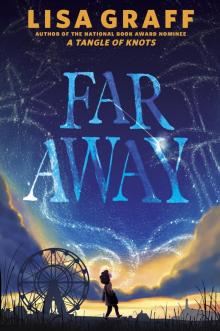 Far Away
Far Away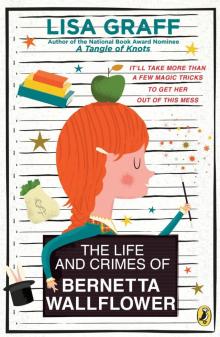 The Life and Crimes of Bernetta Wallflower
The Life and Crimes of Bernetta Wallflower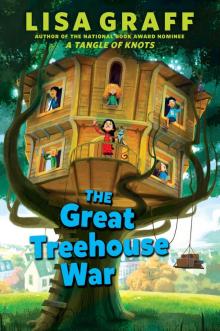 The Great Treehouse War
The Great Treehouse War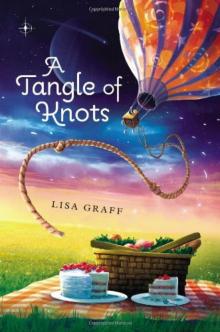 A Tangle of Knots
A Tangle of Knots Sophie Simon Solves Them All
Sophie Simon Solves Them All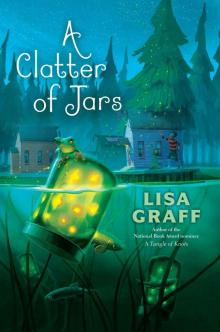 A Clatter of Jars
A Clatter of Jars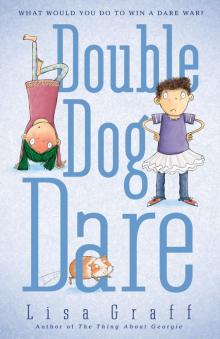 Double Dog Dare
Double Dog Dare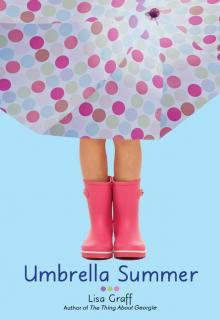 Umbrella Summer
Umbrella Summer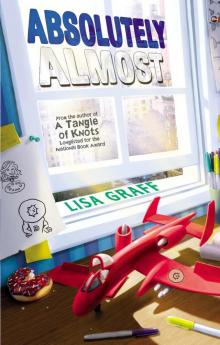 Absolutely Almost
Absolutely Almost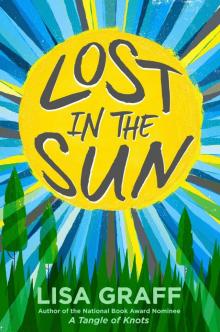 Lost in the Sun
Lost in the Sun